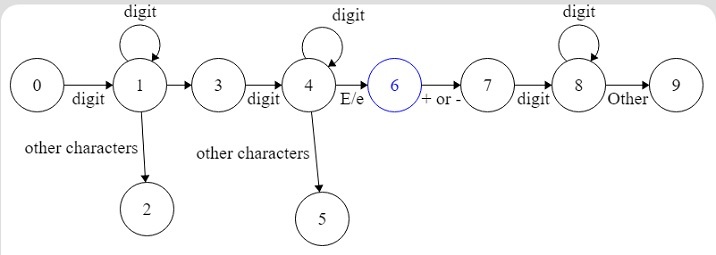C++ 构建用于检查给定整数是否为无符号的DFA程序
在这个问题中,我们需要使用DFA来检查给定的数字是否为无符号整数。我们需要使用二维数组来构建DFA来解决这个问题。
问题描述 - 给定长度为N的字符串str。通过构建DFA,我们需要检查str是否表示无符号整数。根据数字是否为无符号的,输出相应的“无符号整数”或“不是无符号整数”。
示例
输入 - str = “1729”
输出 - “无符号整数”
解释 - 由于数字不包含任何符号,它是一个无符号整数。
输入 - str = “-1729”
输出 - “不是无符号整数”
解释 - 数字以符号开头,所以它不是一个无符号整数。
算法
在开始解决方案之前,让我们了解如何构建DFA来查找无符号整数。
下面是一些无符号整数的例子:
- 1234
-
1234.4567
-
1234E+215
-
1234E-215
-
123.456e+215
-
123.456e+215
上述例子表明有符号整数可以包含数字、点、E/e、+或-,然后是数字。
现在,让我们构建DFA,如下所示:

- 在上述DFA中,我们从第0个状态开始。数字可以以任何数字开头,并且可以包含多个数字,因为我们前进到第1个状态。
-
在第1个状态之后,如果我们获得其他字符,我们可以进入第2个状态,如果我们在十进制数中获得’。’,则可以进入第3个状态。
-
在第3个状态之后,我们至少需要1个或多个数字,并且我们可以进入第4个状态。
-
从第4个状态开始,如果我们获得其他字符以接受该数字,并且在获得E/e后获得第5个状态。
-
如果我们在E/e之后得到’+’或’-‘,我们可以进入第6个状态。这里,E/e代表指数;之后,我们需要写入正或负的幂。
-
之后,我们需要在数字中添加幂。因此,我们可以进入第8个状态。
-
如果我们从第8个状态获得任何字符,我们可以进入第9个状态。
现在,我们需要在代码中构建一个DFA。
在一个二维数组中,第一维表示当前状态,第二维表示字符类型,如下所示。
- 第0个索引是用于数字。
-
第1个索引是’+’或’-‘符号。
-
第2个索引是’。
-
第3个索引是其他字符。
-
第4个索引是’e/E’。
步骤
-
定义字符串
digits并添加所有的数字。另外,定义sign、dot和ex变量,并用相应的值进行初始化。 -
定义数组
dfa来存储状态和下一个状态。同时,定义constructDFA()函数来使用一个二维数组构建DFA。 -
在
constructDFA()函数中,初始化数组为10,因为初始时所有的状态都是不可达的。 -
我们需要通过它们的下一个状态来更新数组的值。例如,初始时我们处于状态0,只有在字符串以数字开头时才能继续前进。所以,更新
dfa[0][0] = 1。 -
在
isUnsignedInt()函数中,首先执行constructDFA()函数来构建DFA。 -
将
current_state变量初始化为0,用于跟踪状态。 -
开始遍历字符串。
-
现在,通过取二维数组中的值来更新
current_state变量的值到下一个状态。例如,如果当前字符是数字,则更新current_state变量的值为dfa[current_state][0]。如果当前字符是+/-符号,则更新current_state变量的值为dfa[current_state][1]。 -
最后,如果
current_state的值是1、4或8,说明给定的数字是一个有效的有符号整数。
示例
#include "bits/stdc++.h"
using namespace std;
string digits = "0123456789", sign = "+-";
string dot = ".", ex = "eE";
int dfa[11][5];
// function to construct DFA
void constructDFA() {
// Initially, all states are unreachable from state 0, so connect all states to state 10 (dead state).
for (int i = 0; i < 11; i++)
for (int j = 0; j < 5; j++)
dfa[i][j] = 10;
// If the state is zero and we get a digit, then change the state to 1.
dfa[0][0] = 1;
// If the state is 1, and we get different characters, set the array value accordingly.
dfa[1][0] = 1;
dfa[1][2] = 3;
dfa[1][3] = 2;
dfa[1][4] = 6;
// Also, Initialize the array value for states 3, 6, 7, 8.
dfa[3][0] = 4;
dfa[4][0] = 4;
dfa[4][3] = 5;
dfa[4][4] = 6;
dfa[6][0] = 8;
dfa[6][1] = 7;
dfa[7][0] = 8;
dfa[8][0] = 8;
dfa[8][3] = 9;
}
// function to check if the given string is an unsigned integer or not
string isUnsinedInt(string s) {
// Build the DFA
constructDFA();
// Initially, the current state is 0.
int current_state = 0;
// Traverse the string
for (int i = 0; i < s.size(); i++) {
// Check the type of the current character and change the state accordingly
// If a digit occurs
if (digits.find(s[i]) != digits.npos)
// Change the state to 0.
current_state = dfa[current_state][0];
// If a sign occurs, change the state to 1.
else if (sign.find(s[i]) != sign.npos)
current_state = dfa[current_state][1];
// If a dot occurs, change the state to 3.
else if (dot.find(s[i]) != dot.npos)
current_state = dfa[current_state][2];
// If e/E or exponent sign occurs, change the state to 4.
else if (ex.find(s[i]) != ex.npos)
current_state = dfa[current_state][4];
// If any other character occurs, change the state to 3.
else
current_state = dfa[current_state][3];
}
// If the current state is 1, 4, 8, then the number is an unsigned integer
if (current_state == 1 || current_state == 4 || current_state == 8) {
return "Unsigned integer";
}
else {
return "Not an unsigned integer";
}
}
int main() {
string str = "1729";
cout << "The given number is " << isUnsinedInt(str);
return 0;
}
输出
The given number is Unsigned integer
时间复杂度 – O(N),因为我们遍历字符串。
空间复杂度 – O(1),因为我们使用恒定的空间来存储DFA状态。
在本教程中,我们构建了DFA来检查给定的字符串是否是无符号整数。此外,程序员可以通过给定的图像可视化DFA,并更好地理解DFA。之后,我们使用一个二维数组构建了相同的DFA。为了获得结果,我们根据当前字符将“current_state”的值更改为下一个状态。程序员可以尝试解决包含DFA构建的其他问题。
 极客笔记
极客笔记